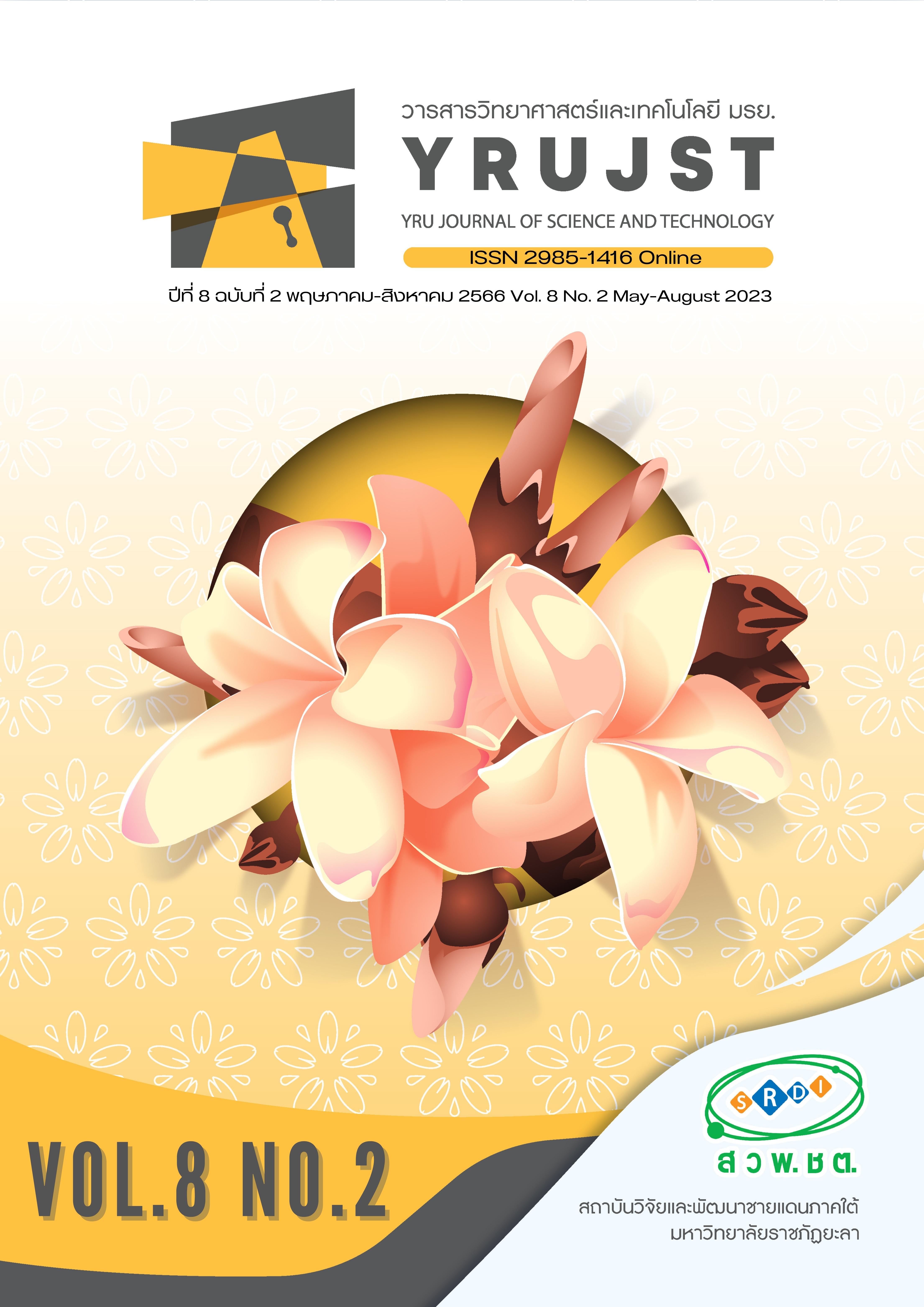ประสิทธิภาพของสูตรสำเร็จเชื้อแบคทีเรียเอนโดไฟท์ต่อการควบคุมโรคแคงเกอร์ของส้มโอทับทิมสยามที่เกิดจากเชื้อ Xanthomonas citri subsp. citri ในสภาพแปลงปลูก
Main Article Content
บทคัดย่อ
โรคแคงเกอร์ของส้มโอเกิดจากเชื้อแบคทีเรีย Xanthomonas citri subsp. citri เป็นโรคที่สำคัญสร้างความเสียหายทางเศรษฐกิจ งานวิจัยนี้มีวัตถุประสงค์เพื่อผลิตและทดสอบประสิทธิภาพของสูตรสำเร็จ จำนวน 12 สูตร ในการควบคุมโรคแคงเกอร์ของส้มโอทับทิมสยามในสภาพแปลงปลูก ประกอบด้วยเชื้อแบคทีเรียเอนโดไฟท์ Bacillus subtilis S1-4 สารพา และสารเสริมประสิทธิภาพ ในอัตราต่างกัน ผลการวิจัยพบว่าสูตรสำเร็จที่ประกอบด้วย ดินขาว (Kaolin) น้ำตาลทราย ซิลิกอนไดออกไซด์ (SiO2) คาร์บอกซิลเมทิลเซลลูโลส (CMC) แคลเซียมคาร์บอเนต (CaCO3) และสารละลายเฟอร์รัสซัลเฟต (FeSO4) อัตราส่วน 75 : 10 : 5 : 5 : 3 : 2 มีคุณสมบัติละลายน้ำได้ดีที่สุด และมีแบคทีเรียมีชีวิตรอด เท่ากับ 2 x 1010 cfu ต่อมิลลิลิตร หลังเก็บรักษาไว้ที่อุณหภูมิห้อง เป็นเวลา 9 เดือน มีประสิทธิภาพในการยับยั้งการเจริญของเชื้อ X. citri subsp. citri ดีที่สุด เท่ากับ 1.62 เซนติเมตร เปรียบเทียบกับแอมพิซิลลิน (Ampicillin) เมื่อทดสอบด้วยวิธี Paper disc diffusion พบความแตกต่างทางสถิติอย่างมีนัยสำคัญ (P<0.05) เมื่อทดสอบใช้สูตรสำเร็จ B. subtilis S1-4 ควบคุมโรคแคงเกอร์ของส้มโอทับทิมสยามในแปลงปลูก ด้วยวิธีฉีดเข้าลำต้นและพ่นทางใบ จำนวน 5 ครั้ง ทุก 10 วัน พบว่า วิธีการฉีดเข้าลำต้นมีประสิทธิภาพในการยับยั้งโรค 60.20 เปอร์เซ็นต์ จำนวนแผลแคงเกอร์ 5.46 แผลต่อใบ และความกว้างบริเวณสีเหลืองที่ล้อมรอบแผลขนาด 0.38 เซนติเมตร ส่วนวิธีการพ่นทางใบมีประสิทธิภาพในการยับยั้งโรค 69.20 เปอร์เซ็นต์ จำนวนแผลแคงเกอร์ 5.41 แผลต่อใบ และความกว้างบริเวณสีเหลืองที่ล้อมรอบแผลขนาด 0.49 เซนติเมตร ไม่มีความแตกต่างกันทางสถิติ (P>0.05) เมื่อเปรียบเทียบกับกรรมวิธีการใช้สารเคมี ยาปฏิชีวนะ ชีวภัณฑ์การค้า B. subtilis ที่จำหน่ายในตลาด และชุดควบคุม (ไม่พ่นสาร)
Article Details

อนุญาตภายใต้เงื่อนไข Creative Commons Attribution-NonCommercial-NoDerivatives 4.0 International License.
บทความ ข้อมูล เนื้อหา รูปภาพ ฯลฯ ที่ได้รับการเผยแพร่ในวารสารวิทยาศาสตร์และเทคโนโลยี มรย. นี้ ถือเป็นลิขสิทธิ์ของวารสารวิทยาศาสตร์และเทคโนโลยี มรย. หากบุคคลหรือหน่วยงานใดต้องการนำทั้งหมดหรือส่วนหนึ่งส่วนใดไปเผยแพร่ต่อหรือกระทำการใดๆ จะต้องได้รับอนุญาตเป็นลายลักษณ์อักษรจากวารสารวิทยาศาสตร์และเทคโนโลยี มรย. ก่อนเท่านั้น
เอกสารอ้างอิง
Bolivar-Anillo, H. J., Gonzalez-Rodriguez, V. E., Almeida, G. R., Izquierdo-Bueno, I., Moraga, J., Carbu, M., et al. (2021). Endophyte microorganisms as an alternative for the biocontrol of Phytophthora spp. In Agro-Economic Risks of Phytophthora and a Effective Biocontrol Approach. [Online]. Retrieved March 1, 2023, from: http://dx.doi.org/10.5772/intechopen99696.
Cho, A. T., & Kasem, S. (2018). Modified growth media of Bacillus amyloliquefaciens S20A1 and biocontrol of bacterial leaf blight of rice. Thai Journal of Agricultural Science, 51(4), 195-207.
De Almeida Lopes, K. B., Pipolo, V. C., Fira, D., Balatti, P. A., Lopez, S. M. Y., Oro, T. H., Pagliosa, E. S. & Degrassi, G. (2018). Screening of bacterial endophytes as potential biocontrol agents against soybean disease. Journal of Applied Microbiology, 125, 1466-1481.
Nikaji, J. (2016). Development of formulation and application of Bacillus subtilis for controlling soft rot disease of chinese mustard. Master’s Thesis. Suranaree University of Technology. (in Thai)
Pimpanuwal, P. (2021). Investigating the potential of actinobacteria to prevent disease and promoting the growth of citrus. Master’s Thesis. Naresuan University. (in Thai)
Poralokanon, P., & Athinuwat, D. (2018). Pilot scale product of novel biopesticide wettable powder formulation to control canker disease of lime in large field application. Thai Journal of Science and Technology, 7(5), 491-515. (in Thai)
Prathuangwong, S., Athinuwat, D., Chuaboon, W., Chatnaparat, T., & Buensanteai, N. (2013). Bioformulation Pseudomonas fluorescens SP007s against dirty panicle disease of rice. African Journal Microbiology Research, 7(47), 5274-5283.
Preecha, C., Wisutthiphaet, W., & Seephueak, P. (2018). Occurrence of canker caused by Xanthomonas axonopodis pv. citri on pummelo (Citrus maxima (Burm.) Merr.) cultivar. Tabtim Siam in Nakhon Si Thammarat province, Thailand and screening fungicides, antibiotics and antagonistic bacteria against X. a. pv. citri in vitro. Journal of Geoscience and Environment Protection, 6(3), 1-7.
Qian, J., Zhang, T., Tang, S., Zhou, L., Li, K., Fu, X., & Yu, S. (2021). Biocontrol of citrus canker with endophyte Bacillus amyloliquefaciens QC-Y. Plant Protection Science, 57(1), 1-13.
Rabbee, M. F., Ali, M. S., & Baek, K. H. (2019). Endophyte Bacillus velezensis isolated from Citrus spp. control streptomycin resistant Xanthomonas citri subsp. citri that causes citrus bacterial canker. Agronomy, 9(8), 470. [Online]. Retrieved March 1, 2023, from: http://doi.org/10.3390agronomy 9080470.
Rabbee, M. F., Hwang, B. S., & Baek, K. H. (2023). Bacillus velezensis: a beneficial biocontrol agent or facultative phytopathogen for sustainable agriculture. Agronomy, 13(3), 840. [Online]. Retrieved May 2, 2023, from: https://doi.org/10.3390/agronomy13030840.
Sudyoung, N., Tokuyama, S., Krajangsang, S., Pringsulaka, O., & Sarawaneeyaruk, S. (2020). Bacterial antagonists and their cell-free culture efficient suppress canker disease in citrus lime. Journal of Plant Disease and Protection, 127(2), 173-181.


